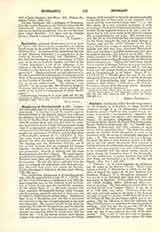

Epiphanius, surnamed SCHOLASTICUS, or in modern terms, THE PHILOLOGIST, a translator of various Greek works in the middle of the sixth century of the Christian Era. He prepared for Cassiodorus the text of the “Historia Tripartita”, a compilation of the works of Socrates, Sozomen, and Theodoret. We also have his translation of the commentary of Didymus on the Seven Catholic Epistles and that of the “Codex encyclicus”, a list of the adhesions of the bishops of the East to the decrees of the Council of Chalcedon, a list drawn up in 458 by order of the Emperor Leo I. Epiphanius made several additions to it. He also translated the commentary of Didymus on the Book of Proverbs and that of Epiphanius of Salamina on the Canticle of Canticles. These works are either lost or as yet undiscovered. “He belongs”, says Julicher, “to the group who, like Dionysius Exiguus, Mutianus, and many unknown others, satisfied the needs of the Latins for translations of Greek theologians.”
PAUL LEJAY

